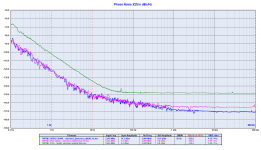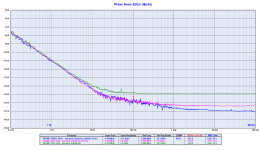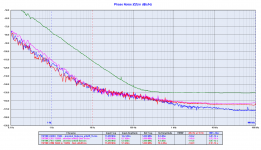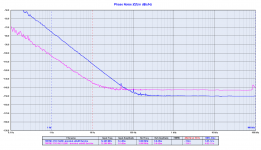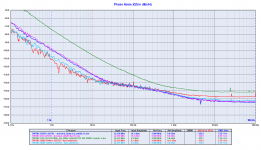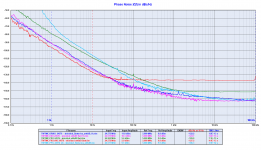Low noise linear regulators for oscillators and doublers
Please see the dedicated thread at
The Well Regulated Power Supply
Please see the dedicated thread at
The Well Regulated Power Supply
LiFePo4 battery supply system for oscilaltors, doublers and DAC
Please see the dedicated thread at
The Well Regulated Power Supply
Please see the dedicated thread at
The Well Regulated Power Supply
I think these parameters have been mentioned numerous times throughout the course of this thread.... I am trying to determine which parameters are important for achieving good phase noise.
What do you mean? Could you please elaborate?...For example, I thought that good signal purity would a have role, but this does not seem to be the case.
Really? Distortion on what signal? Which aspect of performance?...For example the Pierce gives a reasonable account for signal distortion and low noise seen at the crystal, but does not deliver best performance...
What do you mean? Please elaborate..... I am developing a low current solution and determining whether the Pierce can be bettered in this role.
It is not necessary to discuss a particular application. The thread is very long and has a lot of info, but lacks a coordinated summary of the key technical factors. At least I don't see one. If I have missed it, please direct me to the post. Running simulations should create the info one needs, however, this gives unpredictable results. Building and testing seems to be the approach andrea_mori has taken.
I have read various papers and copious attendant mathematics which do not make the central issues any less opaque.
I have read various papers and copious attendant mathematics which do not make the central issues any less opaque.
Last edited:
I just don't think your development adventure fit here. And as you say, the thread is long and har to navigate - discussing another design will not improve on that.
//
//
No new development is being introduced. This was a request for a summary of what has been learned. It seems that is not is available, which is fine.
@Andrea & Roberto A. ... Hmmm ... I am really impressed, Andrea, with what you present here, so a great, many thanks to you & your co-developer Roberto A. It appears that you two have found a mutually very creative collaboration 😉
I would also like to add that although it sometimes happens then it is nevertheless a somewhat rare occasion that something appears in the audio world that I really, really look forward to trying out/use. The oscillators you now have made are one of those rare occasions - and IMHO also provided at a very reasonable cost & (almost 😉) DIY ...
... So kudos are due ...
Cheers,
Jesper
I would also like to add that although it sometimes happens then it is nevertheless a somewhat rare occasion that something appears in the audio world that I really, really look forward to trying out/use. The oscillators you now have made are one of those rare occasions - and IMHO also provided at a very reasonable cost & (almost 😉) DIY ...
... So kudos are due ...
Cheers,
Jesper
Andrea please employ the same sense for the economic forming the prices for us 🙂 😀
BTW excellent work, now when You presented all boards and types, one after another, it iwas a huge job indeed.
Thanks
I will do the best as possible, but I'm not Santa Claus.
Previous GB I lost money and I can't afford this to happen again.
Furthermore, the development of all these devices involved considerable costs so I have to recover at least a part of them.
It's certainly not a business for me, this is not my job, but I can't even afford to lose money.
It is not necessary to discuss a particular application. The thread is very long and has a lot of info, but lacks a coordinated summary of the key technical factors. At least I don't see one. If I have missed it, please direct me to the post. Running simulations should create the info one needs, however, this gives unpredictable results. Building and testing seems to be the approach andrea_mori has taken.
I have read various papers and copious attendant mathematics which do not make the central issues any less opaque.
From my experience building and testing is the only approach to get good results.
Simulation does not say nothing about phase noise, it could help to understand if the oscillator starts or not (and not always), but you can't predict the phase noise behaviour with simulation.
The quality of the output wave does not affect the phase noise, for example the new Driscoll oscillator shows a perfect sine wave while the output wave of the Differential one is not so beautiful, but finally we have measured the same phase noise for both.
But IMHO there is an essential condition to develop low phase noise oscillators: you need a phase noise measurement gear.
Otherwise you cannot understand how your project is evolving.
I just made a little joke. (please don't get this wrong 🙂 )
I understand all You said.
.
I am sure that all members estimate well Your effort and commitment to this topic.
.
Please, how we can order crystal oscillators for the BCBs?
cheers
I understand all You said.
.
I am sure that all members estimate well Your effort and commitment to this topic.
.
Please, how we can order crystal oscillators for the BCBs?
cheers
Outstanding work Andrea and Roberto! Very much looking forward to implement the oscillators in an upcoming project. Probably you wrote this already somewhere, but what is the approximate current draw for the Driscoll board with 5 or 6 osc. , the doubler and the Pierce AIO, respectively?
I just made a little joke. (please don't get this wrong 🙂 )
I understand all You said.
.
I am sure that all members estimate well Your effort and commitment to this topic.
.
Please, how we can order crystal oscillators for the BCBs?
cheers
I know you have understood, but your post gave me the opportunity to clarify some concepts and avoid misunderstandings.
We are trying to develop state of the art devices so don't expect prices similar to the Crystek or Ian's devices.
I'm working on the Order Form, I hope to publish prices and conditions within a few days.
Outstanding work Andrea and Roberto! Very much looking forward to implement the oscillators in an upcoming project. Probably you wrote this already somewhere, but what is the approximate current draw for the Driscoll board with 5 or 6 osc. , the doubler and the Pierce AIO, respectively?
- TWTMC-DRIXO and TWTMC-EXO oscillators 50/60 mA
- TWTMC-DBM frequency doubler around 30mA
- TWTMC-PXO oscillator around 40mA
- TWTMC-PXO-AIO combo oscillator around 80mA
Oscillators phase noise comparison
I attach a few phase noise plots to compare different oscillators at the same output frequency.
I attach a few phase noise plots to compare different oscillators at the same output frequency.
Attachments
At 22/24 Mhz Driscoll and Differential are more or less the same. Is there anything else, performance wise, that may influence the choice?
Also I take it the SMA connectors are related to impedance matching, so cant just be replaced with a wire?
Also I take it the SMA connectors are related to impedance matching, so cant just be replaced with a wire?
From my experience building and testing is the only approach to get good results.
Simulation does not say nothing about phase noise, it could help to understand if the oscillator starts or not (and not always), but you can't predict the phase noise behaviour with simulation.
Simulators like Spectre RF can simulate phase noise, as long as it isn't dominated by obscure unmodelled effects inside the crystal (which probably excludes Andrea's oscillators, as he optimized out everything else 😉 ).
- Status
- Not open for further replies.
- Home
- Source & Line
- Digital Line Level
- The Well Tempered Master Clock - Building a low phase noise/jitter crystal oscillator
